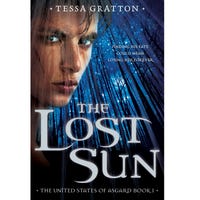If You Could Be Mine
(Image from its goodreads page)
Sara Farizan
This book was getting a lot of awe and wonder in Diversity in YA-esque groups, so I decided to give it a try. Oh, and this is the book I referenced in my last review of The Lost Remote (inside joke inside joke). So you know.
On my second failed attempt of writing a summary for this, here is the goodreads summary:
Seventeen-year-old Sahar has been in love with her best friend, Nasrin, since they were six. They’ve shared stolen kisses and romantic promises. But Iran is a dangerous place for two girls in love—Sahar and Nasrin could be beaten, imprisoned, even executed if their relationship came to light.
So they carry on in secret—until Nasrin’s parents announce that they’ve arranged for her marriage. Nasrin tries to persuade Sahar that they can go on as they have been, only now with new comforts provided by the decent, well-to-do doctor Nasrin will marry. But Sahar dreams of loving Nasrin exclusively—and openly.
Then Sahar discovers what seems like the perfect solution. In Iran, homosexuality may be a crime, but to be a man trapped in a woman’s body is seen as nature’s mistake, and sex reassignment is legal and accessible. As a man, Sahar could be the one to marry Nasrin. Sahar will never be able to love the one she wants, in the body she wants to be loved in, without risking her life. Is saving her love worth sacrificing her true self?
There. That's good enough. Long, but a fairly good, semi-spoilery summary. Okay.
This book is possibly one of the most important books I have ever read. Frankly, I think that If You Could Be Mine should be taught in school instead of the same three books every year. There does happen to be one problem, though.
Schools don't like the idea of lesbians. Oh, sure, drugs, alcohol, suicide? Those are cool. We can keep those. But lesbians? God, are you trying to kill us? And lesbians facing real world problems instead of things that will never happen but sound moral-ful? This is clearly a problem. Hold me, I'm feeling faint.
Ignoring that little rant, yes, Sahar and Nasirin face some pretty serious issues. Drugs and alcohol are referenced, death is faced and people fall into the amazing pit that is the gender spectrum. Religion is mentioned and religion is questioned. These are things that happen. Oh, and apparently other countries exist.
Since this book is a romance book (I know, what is this, the second one on all of Yas Read Yas?), I'm going to start instead of end with the romance.
Sahar and Nasirin are definitely working on the "opposites attract" idea. I've always that of that as a rule only for magnets, but apparently people generate magnetic fields and it works for humans, too. Sahar is a bit of a tomboy, even though it doesn't quite show in the book. Nasirin, however, is pretty-in-pink feminine. Somehow, though, it works. I'm not sure if my opinion has something to do with the fact that this is a romance novel, so it has to work, or what, but I liked it. There was always a slight (and sometimes less slight) note of irritation with Nasirin from Sahar, but the chemistry was there.
On the actual plot (Whaaaaaaat, the plot wasn't the romance? I know. Crazy. I know non-romance novels that the romance was actually the plot), it was a bit odd. Not in a bad, oh-gods-of-Asgard-and-other-such-holy-places kind of way, but it was just a little strange. The arranged marriage part was interesting, but Sahar's attempt at changing her sex (not gender, though) seemed like the wrong way to go about stopping the marriage. It felt almost a bit forced.
The style was good, maybe not my favorite (Sahar almost sounded lost in her thoughts at random points), but certainly not a turn-off. The pacing was great, almost perfect. Actually, I'm not sure what perfect would be, since this is the best pacing I've seen so far, but I'm sure I'd know it when I saw it.
I really liked the random cultural tidbits about, say, how in Iran you don't put sugar in your tea, you crack sugars cubes between your teeth and drink through them. Though my tea-drinking habits will remain unchanged, it was interesting to learn about the cultures of other countries.
So, I mentioned that there were important (read: somewhat adult) topics in here. Yeah, while drugs and alcohol weren't a focus, and sex wasn't a huge thing, it was still kind of adult. Makes enough sense, since Sahar is seventeen and that's pretty late in the YA spectrum. So, I wouldn't recommend it to anyone who wants to shield their virgin eyes.
Yay, spoilers! Mostly, I just want to talk about the ending, so I have to put it under the great arch of spoilerhood.
In the end, Nasirin and Sahar have to break up. Sahar goes off to college and Nasirin goes off to a really, really big house.
Sahar eventually visits Nasirin, and they decide the relationship wasn't right for them anyway and blah blah blah.
Now, here's the entire reason I spent the past, like, ten minutes working on that fancy, rainbow text. I have to ask why?! Why can't I find a story about lesbians that ends happily? That ends up with them happy and together? Is it a rule, that as a lesbian, your life must be tragic and you'll feel no love? Why must this happen to me all the time?
Now, if anyone knows about happy lesbians, feel free to comment.
~Corinne


